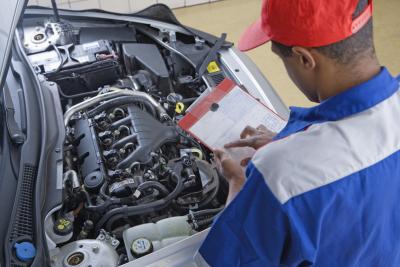
Turbos are among some of the biggest mechanical issues to normally go wrong with cars. From turbo spikes to lagging, there are many problems that can go wrong with a turbo during normal driving conditions. You can troubleshoot some of the issues you may be having with your turbo system.
Turbo spikes are a very common issue on cars with turbos. A hole in the turbo lines can cause extra air to get into the turbo inlet and boost the PSI, or pounds of air forced through the turbo, spiking it to a dangerously high rate. Normal factory turbos will hit only 5 to 10 PSI, but when there is a turbo spike it will send the PSI to 25 to 30 PSI, which could cause the shaft of the turbo to break loose and blow the turbo itself.
The easiest remedy to this problem is to search for holes in the turbo system's rubber lines. Have a friend rev the engine until the boost kicks in, and feel for pressurized air leaving the line. For a quick fix, wrap layers of tape over the hole; but it would be better in the long term to just replace the line as soon as possible.
Another common problem with turbos, but which doesn't even involve the turbo itself, is turbo lag. While turbos are normally set by the factory to hit a certain level of PSI when hitting RPM throughout the gears, sometimes the turbo cannot hit the regulated PSI the ECU requests, slowing down the car. While this ends up being a problem for the turbo, it actually comes from the airflow to the car.
Check your air filter to be sure it is clean. This is usually the main problem, as the dirt collected will restrict airflow and not allow the turbo to breathe. If the problem persists, there is a restriction inside your intake; a trip to the dealership may be required to find out where this restriction is.
The last step of a dying turbocharger is it being blown completely. A blown turbo will not operate, and will be obvious by the sounds it makes and the obvious effect on performance. A blown turbo will continue to try to perform; but once it tries to spool to gain PSI, the sound will be different from normal operating standards, as it may grind or have no breathing sound at all. Coinciding with that, you will notice a difference in the car's performance; gaining speed will be noticeably different as the RPM rises, because there will be no PSI going through the turbo to give the engine that extra increase.
You must replace a blown turbo. Most cars' turbos must be replaced between 80,000 and 100,000 miles to prevent a blown turbo. A blown turbo can have an adverse effect on engine performance, causing piston and valve problems, so replace it immediately.